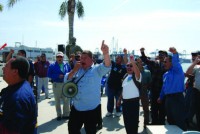
Source Jesse Marquez
Affiliation Coalition for a Safe Environment
Phone 310-704-1265
By Courtney Gonzales and Jennifer Miller Download PDF: CFASE.pdf
Wilmington, California is a poster child in the struggle for environmental justice. Over 85% of Wilmington’s 70,000 residents are Latino, and 35% live in poverty. Wilmington is home to two of the largest US ports, four major oil refineries, four asphalt refineries, a large oil field, and many other industrial facilities; it is also surrounded by three major freeways and crossed by the Alameda train corridor. Jesse Marquez, a lifelong Wilmington resident who lives four blocks form the Port of Los Angeles, decided something needed to be done to address the alarming public health and safety risks in his community.
“Almost every family I know has someone suffering from asthma, respiratory health problems, lung disease, or cancer,” says Marquez. “Our community is located in what is now called the “Diesel Death Zone.” But when Marquez traveled to Sacramento to inform state legislators about the magnitude of the public health and saftey crisis his community faced, he says the response was chilling — California Assemblymembers, says Marquez, wrote off Wilmington’s environmental toxicity as simply the cost of economic growth in Southern California. This response galvanized Marquez and in 2001, he founded the Coalition for a Safe Environment (CFASE), a community-based organization that fights for environmental health and justice in the harbor communities near the Ports of Los Angeles and Long Beach. CFASE works to mitigate and eliminate public exposure and public health impacts caused by air, land and water pollution generated by the ports, international cargo & cruise ships, the petroleum industry, energy sources and the goods movement industry.
Marquez believes that the public has a right to know about the risks. In 2014, CFASE launched the LA Community Environmental Enforcement Newtork, installing an air-quality monitor on the roof of a family’s home at the fenceline of the Phillips 66 refinery. The solar-powered device will gather real-time data on the levels of air pollution that Wilmington residents are breathing in, and the results will be posted online.
CFASE has received national recognition for its success in negotiating community benefits agreements with innovative mitigation measures to improve air quality, and with public health and alternative technology programs at the ports. But it has not been easy. “Our work gets personal. My life has been threatened numerous times,” says Marquez. But he adds, “those of us who choose to be outspoken as community leaders take on personal sacrifices because we understand the importance of our work and the significant future benefits for our families, our neighbors, and our community.”
Partnering with universities that can provide research to build the evidence about the area’s toxic exposures and their impact on health, and establishing an online community complaint system to track problems, are two CFASE strategies to help push for the policy changes required to protect this community. Others include lawsuits against polluters, and against government regulatory agencies for failing to protect local communities. CFASE has also submitted countless public comments on the numerous laws, rules, regulations, public policies, programs and projects shaping the port, its operations, and transportation and industrial activity in the region. While the work of CFASE may “get personal” and be local, the implications of that work touch us all. As the largest port complex in the US, LA/Longbeach brings in a substantial proportion of the imported goods that people living in the US buy every day; and while those living in the Diesel Death Zone bear the majority of the immediate health burden, the greenhouse gas emissions contribute to the global climate change affecting us all.
For more information:
Coalition for a Safe Environment: 310-704-1265
Courtney Gonzales is a Communication Specialist with the Community Food and Justice Coalition. Jennifer Miller is a Senior Researcher with the Public Health Institute.


